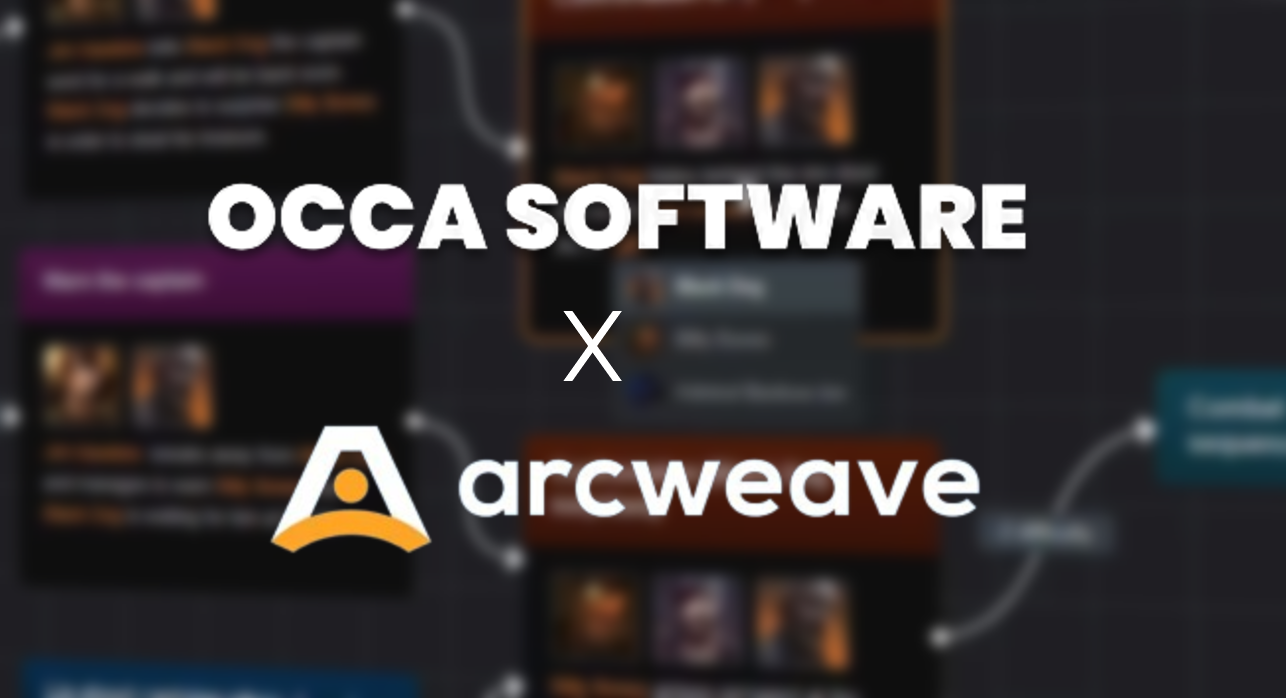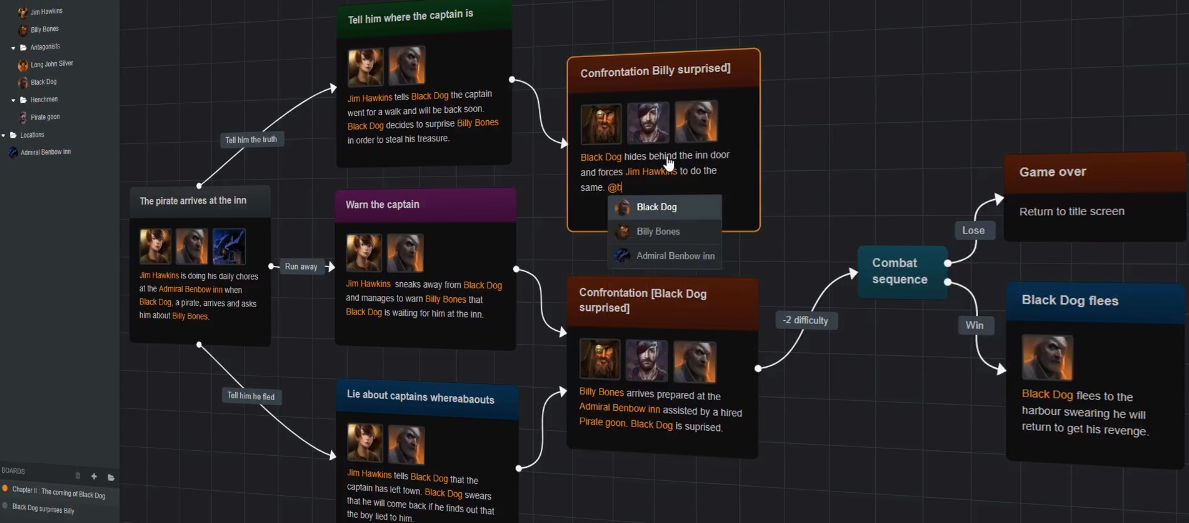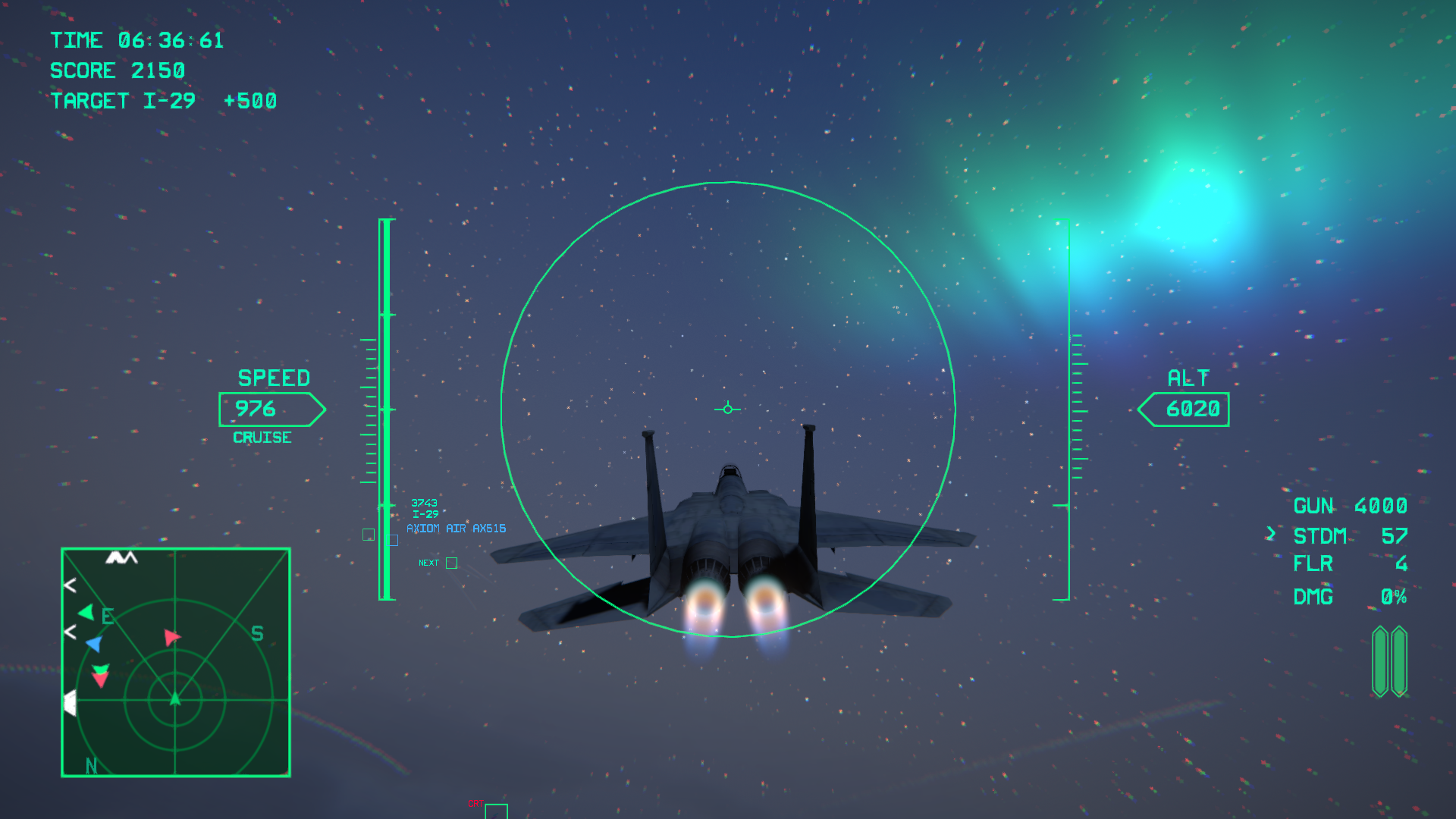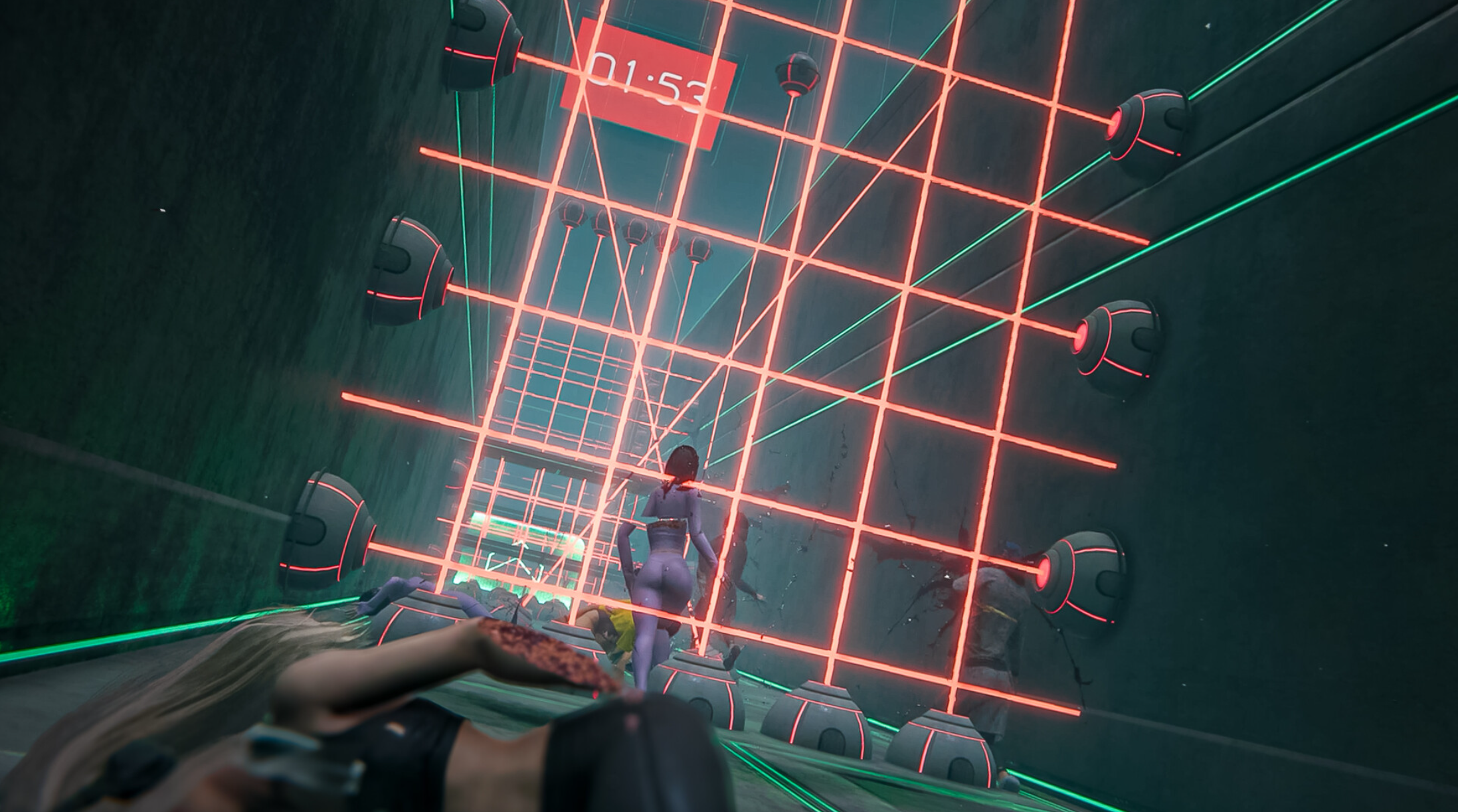OccaSoftware partners with Arcweave to democratize game design
 By
Elle Sillitoe
·
12 minute read
By
Elle Sillitoe
·
12 minute read
Michael Sacco, founder of OccaSoftware, shares his goals to revolutionize game design for Unity developers alongside recent partnership with Arcweave.

OccaSoftware is a tool and asset software company for Unity developers. Founded in 2021, OccaSoftware is already used by over 40,000 developers and is rapidly growing. By March 2024, OccaSoftware joined the team of Arcweave Ambassadors.
Do you mind introducing yourself and what you do over at OccaSoftware?
MS: My name is Michael Sacco. I’m the founder at OccaSoftware and in that role I’m responsible both for the day-to-day operations as well as the long-term vision and strategy for the company. So, I’m very involved and very hands on, and also working on growing the team as well.

Michael Sacco, founder of OccaSoftware.
What does that long-term vision and strategy look like?
MS: So, right now our interest is in expanding our capabilities. Right now we offer quite a few assets but our long-term vision is that this will be a one stop shop for anyone looking to build their game. And so, we need to build into other visual categories from a 2D and 3D perspective as well into more gameplay systems like enabling character controllers and UI design, and things like that.
What is OccaSoftware’s mission statement?
MS: OccaSoftware’s mission is simple yet powerful: to deliver high-quality assets, exceptional value, and an excellent user experience that enables any game developer, from beginners to seasoned professionals, to feel confident and capable of building their best games.
How do you think Arcweave will support that mission for OccaSoftware?
MS: I think one thing that a lot of game developers really struggle with is working on the narrative design. Actually creating a branching narrative is really challenging regardless of your background or your experience. I think it’s really incredible what Arcweave has done for setting up this application that makes it a lot easier to visualise how the narrative ties together and how that relates to actual context-aware actions in the game.
By using Arcweave with OccaSoftware, you’ll not only have the visuals and gameplay systems you’ll need, but you will have this really cool core narrative experience that enables the players to connect with what’s going on in the game and have a strong emotional connection to the game as well. Used together, Arcweave and OccaSoftware provide a comprehensive solution that empowers developers to create not only great looking games, but highly engaging narrative experiences as well.
2024 showcase reel of games made with OccaSoftware.
OccaSoftware's partnership with Arcweave began because you reached out to connect with us on X. What compelled you to connect?
MS: I’d actually seen your website a year or two ago and I wanted to connect after seeing the impressive narrative tools that the team has built. Personally, I don’t work very much on narrative experiences and so I was like, "This is really interesting and something that I can actually see the vision for in how it could help a team express the overall vision for their game." I wasn’t actually initially thinking about a partnership or anything like that, but I just wanted to connect and let you guys know that I thought your work was really cool. And that sort of snowballed into what we have now.
The Arcweave team’s dedication to detail and commitment to empowering developers with intuitive and powerful narrative design capabilities is incredible. It is a huge challenge for any team, big or small, to create complex narratives. Arcweave does a fantastic job to unlock that door to more compelling, detailed, and complex narratives that capture the hearts and minds of players.
You mentioned that you don’t work much on narrative yourself, so what is your background? Were you involved in game development before this?
MS: Before this, I was working at American Express as a Senior Product Manager. I was working on our Core Card Platforms where I was responsible for managing our Account Management systems and our statementing systems. So, it’s actually totally not related to game development [laughs] but I had been playing games my whole life and I was always really interested in gaming and game development. Part of what got me into product management was when I was younger, I was playing these online live-service games like World of Warcraft or Counterstrike, and they would get these updates to change player abilities or change the stats. And I was like… Who’s deciding what this stuff is?
And so that sort of snowballed me into product management and working ultimately at American Express because I was really interested in finance. One of the cool things that American Express was working on at the time when I joined was offering these really incredible card products that were focused on financially insecure people who maybe don’t have incredible credit or don’t have really incredible finances. So, it was really exciting to be able to enable and empower people in these situations.
So, then I was working on statements and account management and things like that… working on those really complex systems. And at night I was doing game development stuff and learning Unity and so on. And I was like, "Wow, this is actually really hard." And there aren’t really great solutions for a lot of these problems, and these are really common problems that every game developer runs into. So, wouldn’t it be great if there was some way to simplify that so people can just make their game without having to figure out all these complex systems like, "How do I make clouds or make fog or things like that?"
Showcase of Altos, OccaSoftware's sky system that supports volumetric clouds, skybox rendering, atmospheric fog, and weather effects for Unity.
What made you take that leap to start doing OccaSoftware full time?
MS: When I left American Express, I was actually going on a kind of sabbatical. So, I left to take a year off and kind of reset and see where my passion and the things that I’m really, really interested in would take me. So, during that one year I was basically just working with Unity all day, like, all day everyday for 15, 18 hours a day. Like, waking up, jumping on Unity, learning everything I could, and then jumping off and going to sleep. And I was like… I can just do this full time. I saw that there were so many opportunities for people to improve their games and I saw that, you know, there are a lot of games being made, especially for new developers. There are so many people we could help in this space. So, that’s definitely the persona I was channelling.
Why Unity specifically?
MS: I think that Unity is really unique as a game engine because it really has a customer base that spans totally beginner game developers as well as very experienced game developers. These experienced game developers are producing incredibly high-quality tutorials and guides, and Unity has really good documentation and things like that. And so, it makes it very easy for beginner game developers to jump in and learn the ropes and see what they need.
So, I think that it’s actually the perfect platform from which to build a business like this where it’s enabling both beginner game developers as well as experienced game developers to feel more confident and capable in building their games. The core of my vision for OccaSoftware is to make it even easier for new game developers and small teams to be able to quickly spin up a game that looks and plays great, and to deliver it to players. Starting with the Unity engine as a base enables game developers to work in a context that they’re comfortable with while unlocking new visual or gameplay capabilities for their projects.
So, you feel like OccaSoftware spans that community of both beginner and expert Unity devs?
MS: Yeah, definitely. And that’s definitely something that we’re looking at, like how we can simultaneously serve both groups. Because, for beginner developers, even things like adding a render feature to your universal render data might be a bit complicated. And those complications kind of reveal hidden challenges in the customer experience and the user experience that we can actually solve… that we can actually make the overall product better not only for these beginner developers but also for these expert developers.
Why do you think Arcweave is a useful tool for OccaSoftware users?
MS: Arcweave is an incredibly useful tool for OccaSoftware users. While our assets and tools empower developers to create visually stunning games, developers also need an amazing narrative experience to really engage players and bring those games to life. By combining OccaSoftware for the visual components with Arcweave to unlock the narrative side, OccaSoftware developers can craft complete and polished experiences that both look and play great. And so, Arcweave really unlocks that capability for these game developers to not only make a game that looks really good, but also has this really tight connection to the gameplay as well. And I think that, from a player perspective, makes the experience a lot better and so ultimately that will make these developers make better games that are higher quality with a lot less work and effort.
 Arcweave is a user-friendly web-based solution for narrative design.
Arcweave is a user-friendly web-based solution for narrative design.
Despite being in the early years of OccaSoftware, you are already being used by over 40,000 game developers. How did you grow your community so quickly and successfully?
MS: I think that it’s a testament to how we’re executing our mission for the company. We are extremely focused on delivering the highest quality product, offering exceptional value, an unparalleled user experience for our users and our community. As part of that, we have seen a huge amount of organic growth from recommendations and positive feedback directly from our customers. So, we’ve been very, very product focused and product led as opposed to being marketing led or something like that. So, basically, we’ve just focused really hard on delivering these core values and I think people see that. And also, when people have any questions or things like that, it’s extremely important to me that when someone’s buying and using these products that they’re actually able to get the most value out of them.
I’m super, super active on our discord and on email, and I’ve got so many messages from people being like, "Wow, I can’t believe you responded so quickly, I can’t believe you fixed this in just like an hour" and so on. It’s super important to me that as customers or users experience these problems that I’m there to help solve them and to enable them to get the maximum value out of these products. So, I think it’s a combination of us delivering on that vision and on the exceptional customer support and experience.
 At Skies Edge is an arcade flight action game developed by Mackerel Sky with OccaSoftware.
At Skies Edge is an arcade flight action game developed by Mackerel Sky with OccaSoftware.
Are there any challenges you've faced throughout the development of OccaSoftware?
MS: Actually, one of the biggest challenges is coming from a product management background. I’m very data driven and so it’s very important that when we are looking at our product that we understand how people are using the product and how they are interacting with it and what challenges they are encountering. Maybe people download it and then get stuck but never reach out, and then they just get stuck. That’s like a worst-case scenario. And so, to help avoid that, I try to be super, super close with our customers and users.
And basically, because we’re not collecting analytics or telemetry data about how people are using the software offline in their projects, instead we’re basically just sitting next to our customers, getting on video calls with them… Like, whatever hour of the day they need, I’ll get on a video call with them and help them get set up or like troubleshoot the issue with them or whatever. And in doing that it helps reveal the challenges that new developers might experience and the ways in which we can improve our documentation or our messaging around how to get set up and things like that.
With your community growing so rapidly, do you think this is a sustainable plan that can handle your community growth long-term? Is this why you’re looking to expand your team?
MS: Yeah, so, we’re already expanding from a team perspective. We’re not a marketing driven company but I do think that it’s important that we can really express the value that you can get out of the assets because they are really powerful, and they have a lot of features that from a product driven perspective we might not talk about enough. And so, making sure that we have someone focused on communicating the product values that we’re delivering. And then also thinking about bringing on someone from a developer experience standpoint just to make sure that we continue to stay extremely close with our developers and continue to get that feedback and have internal developer advocates to help with that as well. So, we are growing in those respects and I definitely see this as a long-term project.
What are your future goals for OccaSoftware?
MS: In the near future, our immediate priorities lie in broadening the array of asset offerings within the OccaSoftware ecosystem. By expanding our toolset, we aim to create a comprehensive one-stop solution for any developer. We believe this will drive the best user experience and best value for our users. Two major areas that I see us moving into here include gameplay systems and 2D rendering capabilities. At the same time, we are actively working to extend compatibility across various render pipelines and target platforms. This will empower our users to take advantage of the full potential of OccaSoftware’s capabilities, regardless of their preferred development environment or deployment platform.
And thinking even longer term, what I would really love to do is somehow upend the traditional rasterization pipeline. Right now, it’s kind of a huge chore if you’re making a game; you have to get all these models and materials and shaders and what does my sky look like and all these other problems, and then you have to arrange them all in your scene. And you have to make sure everything is touching properly and is lit correctly, and you have to bake the lighting. And it’s like… what a nightmare, especially for a small team.
Our ambitious goal is to enable real-time rasterization of game scenes and environments directly from data inputs, circumventing the traditional rendering pipelines. Instead of relying on pre-built 3D assets and models, developers could simply feed AI models with raw game data - object descriptions, positions, scene layouts and more. The AI system would then instantaneously interpret and rasterize this data to generate final rendered imagery for the game world. This would unlock a revolutionary workflow where developers construct the building blocks of a scene, such as level geometry and object properties, while an AI co-pilot dynamically visualizes it all in real-time as photorealistic imagery. This would completely eliminate manual asset creation and the technical challenges of traditional rendering.
Developers could experiment, iterate, and visualize their creative ideas on-the-fly within the OccaSoftware environment. So, this would enable complex and advanced world-building and graphics for any developer, even complete beginners. This system would still provide developers full creative control over the high-level artistic direction so that the AI acts as an accelerant, not a replacement. It would ultimately be a way of translating the developer’s vision into pixels on the screen. I think that would totally enable game developers to iterate a lot more quickly and to achieve their vision a lot more quickly by focusing more on important gameplay and narrative instead of like… "How do I make this bottle look more like a bottle"[laughs].
 Buto, a volumetric fog and lighting tool developed by OccaSoftware, used in the game Dystopika.
Buto, a volumetric fog and lighting tool developed by OccaSoftware, used in the game Dystopika.
With that idea of democratizing game design, what opportunities do you think it might open up for students or young people looking to get into games?
MS: I think that it would open up a lot of opportunities. I think that, in particular, if you’re not very comfortable with programming and especially graphics programming or shader programming and things like that, it can be really hard to express your creative vision. Like, "Ugh, I want this thing to be encased in a crystal that is reflecting the light" and stuff like that. And when you start thinking about how you are actually going to accomplish that as a student who doesn’t have any experience in writing complex algorithms in light-bouncing and shaders, it feels totally impossible. But if you can unlock that capability using real-time AI then, all of a sudden, you can focus more on what your vision is and how that vision interacts with the world instead of having to deal with all these nuances of graphical programming.
Are there any exciting projects that OccaSoftware is being used in currently?
MS: Yeah, right now we’re actually used in a bunch of projects by the developers in our community and I absolutely love featuring them. So, we have a section in our discord for "Made with OccaSoftware" and we also have a section on our website. Even our header, our video on our homepage, is showcasing their games. For example, Straight Back Games recently released an incredible multiplayer game, LASERS, that uses Altos and Buto for volumetrics along with other pieces of our rendering toolkit. Apart from that, Infiniwar is an exciting RPG/roguelike that is in production by a solo developer, Joe Theis. These are just two of the games but there are so many more exciting projects being made with OccaSoftware. Knowing that these are projects that are enabled by our tools and technology and that they’re helping people deliver their projects onto Steam, onto itch.io... it’s just super rewarding, and I’d love to see more of that going forward.
 Developed by Straight Back Games, LASERS is a multiplayer game about surviving deadly laser mazes.
Developed by Straight Back Games, LASERS is a multiplayer game about surviving deadly laser mazes.
Do you have any advice for Unity game developers who are starting out in the indie space?
MS: Yeah, I have a few pieces of advice. One would be don’t try to do everything yourself. I think as an indie developer it can feel like, "I’m supposed to do everything myself". But that’s really not the case. And even a lot of indie games are like 5 or 10 people so if you’re a solo indie developer then that’s even more the case. Another thing is to try to follow a structured learning path. It’s very easy to jump in and start making a game, and I think that’s good because you do have to do the work, but I think it’s very important to sit down and learn things in a structured way so that when you go and jump into your project, you can easily overcome any challenges you might encounter.
Also, if you get stuck, feel free to ask for help. A lot of times when people get stuck, they don’t want to ask for help and then they butt their head against the wall for like a week. But it could be as simple as just asking a simple question in discord and then someone will respond, and it will instantly "unstuckify" you. And then you’ll be able to continue with your project and save basically a week of being stuck. So, one of my favourite things is in our discord, everyone’s really supportive and I see people come in and ask a question that you could easily get stuck on for a week, and then someone from the community is like, "Oh, this is how you do that," and it’s instantly solved.
Yeah, I think indie devs often feel like they need to make everything from scratch, but things tend to be a lot easier when you just ask for help.
MS: Exactly. It’s like… if you want a peanut butter and jelly sandwich, you don’t go and start a peanut farm [laughs]. Just like, get the peanut butter and the jelly and the sandwich.
Thanks to Michael Sacco for taking the time to answer all of our questions and for his insight. Arcweave will be featured on the OccaSoftware blog with part 2 of this case study, so keep an eye on our socials to be notified on its release. Make sure to visit the OccaSoftware website, follow OccaSoftware on YouTube and Twitter/X, and join their Discord community.